Do We Only Change Our Thinking When Disaster Strikes? [TSU Response]
My favourite 'Road to Damascus' article is by environmentalist George Monbiot, who described how he changed his mind about nuclear power after Fukishima. Whilst he still found problems with how the industry is run, the disaster of Japan's power plant had him changing his mind about the cost of nuclear power:
Every energy technology carries a cost; so does the absence of energy technologies. Atomic energy has just been subjected to one of the harshest of possible tests, and the impact on people and the planet has been small. The crisis at Fukushima has converted me to the cause of nuclear power.
Whatever our opinion is about nuclear power, what is laudable about this post is his ability to look at the facts on his table and change his thinking, despite some very adamant views that nuclear power is folly. To me, this is a sign of flexible thinking - not 'intelligence', as this adjective is far too value laden, but flexibility as opposed to dogged stubbornness. Changing our mind is not a sign of flakiness or weakness, but a quality that we need in a world that is ever changing, and often more brutally so, in times of disaster. We need to be able to change to psychologically cope, but also to make something new and better out of the old world order. Disasters often force us to see things in different ways, re-examining old problems. Do we build the same architecture, or do we re-imagine something better?
This is relevant to our inner architecture too. We are reminded of of lessons we know in our hearts, but have forgotten.
The 'old world order' can often be seen as to blame for natural events. We see it as part of a larger karmic debt as an effect of poor morality on the part of man. In this world view, everything is connected. The zen poet Ryokan wrote, after an earthquake in Japan in the 1800's:
Day after day after day,
At noon and midnight, the cold was piercing.
The sky was thick with black clouds that blocked out the sun.
Fierce winds howled, snow swirled violently.
Wild waves stormed heaven, buffeting monster fish.
Walls trembled and shook, people shrieked in terror.
Looking back at the past forty years, I now see that things were racing out of control:
People had grown lax and indifferent,
Forming factions and fighting among themselves.
They forgot about obligations and duty,
Ignored notions of loyalty and justice,
And thought only of themselves.
Full of self-conceit, they cheated each other,
Creating an endless, filthy mess.
The world was rife with madness.
No one shared my concern.
Things got worse until the final disaster struck -
Few were aware that the world was star-crossed
And dreadfully out of kilter.
If you really want to understand this tragedy, look deep inside
Rather than helplessly bemoan your cruel fate.
Ryokan
The world certainly seems 'out of kilter' at the moment, especially as my own country, Australia, is currently in the grip of a national disaster. Words like 'apocalyptic' and 'unprecedented' is part of the media vernacular. The world is donating huge amounts of money in sympathy, particularly moved by 100 million odd animals who have been burnt over 46 million acres of land and are quite possibly now threatened by extinction. Yet they certainly aren't unprecedented. In 1974 bushfires 290 million acres went, and in 1983, which is in my living memory, 520,000 acres were burnt. The varying numbers of people, houses and wildlife are dependent on many factors - less dense population, for one. However, they are still a current disaster and one that comes at a time the world is particularly focussed on climate events and real concern for what the future might look like.
Our prime minister is being subject to intense scrutiny - Ryokan might have argued, like many of us here do, that Scott Morrison is 'full of self - conceit' and failed to share the concern of climate change advocates until 'the final disaster' as an effect of all the choices this government has made to ignore climate scientists and push on to put this particular economy - certainly not a sacred one, with the land or earth as center at all times - first. Thus, if we were to view the fires through the lens of Ryokan and Japanese Buddhists, it is morality, not nature, that has caused such madness. Many cities have been suffocating under smoke for weeks, affecting their respiratory systems, whilst at the same time, we're ranked one of the worst in the world for emissions. Our PM, Scott Morrison, brandishes coal with glee and approves new coal mines in Queensland. What would our landscape have looked like if we had a government that valued the earth as mother for us all, not power, popularity and greed?
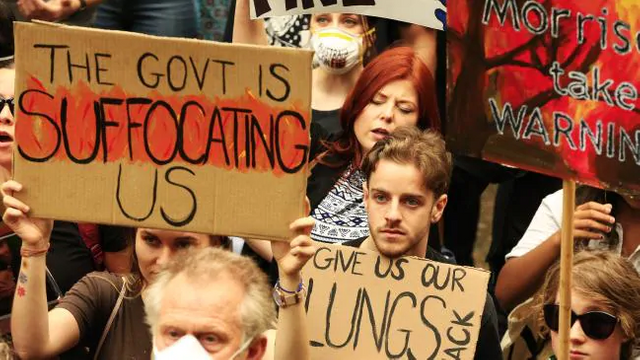
Image Source.
I am not here to argue for or against climate change, or rage against our leadership, however much I would like to. What is fascinating is whether we can change in the face of a disaster. With each war over the ages, we don't learn - we create bigger weapons and national rhetoric so that war becomes more inevitable, and more ferocious. In between, we go about our ordinary lives as if war was part of a terrible past, rather than an inevitable future. We immortalise those who fought, yet do nothing to prevent war happening again. We become locked in mindset that says we can't do anything about it, and this is all humanity has got. It seems easier for people to not change than change, because it is easier, and we call this suffering 'home' because it is familiar to us.
Yet disasters like this illuminate man's great potential. It creates enough discomfort and unfamiliarity that we surprise ourselves with our generosity and compassion. There are so many stories of people who, usually divided and insular, protective and isolated, have rushed in to support their fellow men and woman. Disaster is a great leveller. When we are stripped to nothing but the clothes on our backs, we have more compassion and empathy for others. We also begin to see life's impermanence in much more vivid detail. Our identification with those external things such as wealth, youth, health or reputation cannot hold when disaster strikes. It's during these times we question who we are, and where we are headed. What was the point of working all our lives only to get cancer upon retirement and die within two years? What was the point of having the house overlooking the ocean with a magnificent view when one goes bankrupt and loses it all? What was the point of separating ourselves from our neighbours for years when in one afternoon, we are both standing on a beach watching our houses burn down with burning gum leaves raining down upon us?
“We need to be aware of the suffering, but retain our clarity, calmness, and strength so we can help transform the situation.” - Thic Nat Hanh
Many become more compassionate and giving than they thought possible. Compassion drives them from their homes to donate time, money and possessions to help those in need. Millions of dollars are raised, truckloads of hay are carted from miles away, and boxes of food and clothing are donated. People donate houses and rooms, offering their Air BNB for fire victims. My local yoga studio had a fundraiser which has very nearly enabled our friend who has a yoga studio in Cobargo that burnt down to rebuild it in the future, recognising how it fulfilled a need in that community.
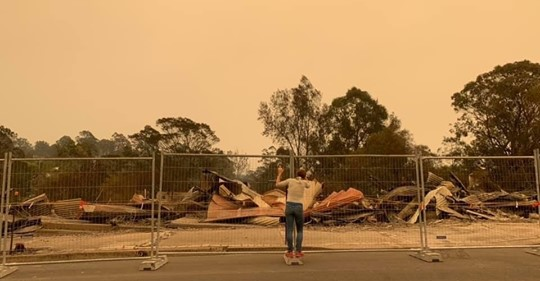
Amrei looking at the remains of her studio in Cobargo, 2019
There is nothing more permanent than impermanence, we are reminded. Disaster teaches us that lesson time and time again. We cannot hold ourselves to what we think we are or how we believe the world should be when the rug can be so swiftly pulled out from underneath us. But we can be more resilient, more adaptable, and more willing to change. We can make a choice to be compassionate and generous over miserly and self interested. We've proven that we can. We have been reminded that it's important to have respect, love, and compassion for each other, and that we must treasure what we have.
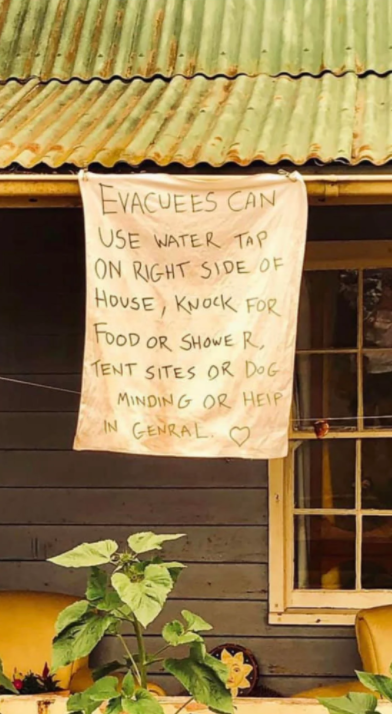
Image Source
Our country might have an excellent standard of living and provide economic opportunities for all, but it is nothing without its moral core. The fires have shone a spotlight on our excess consumerism and thoughtless approach to a future that might see the end to the Great Barrier Reef and the extinction of koalas. This disaster gives us a chance to reflect on what we really care about and work together to a new future. We might not agree that the fires are directly a result of our excesses, but we can agree that we can't go on the way we have. It's a chance for us to reflect as a nation and to think about what our future might look like.
Disasters might not help change our thinking entirely, but serve to remind us of what is most important. Whether we keep that in the forefront of our minds when the dust has settled and the gum trees grow back is up to us.
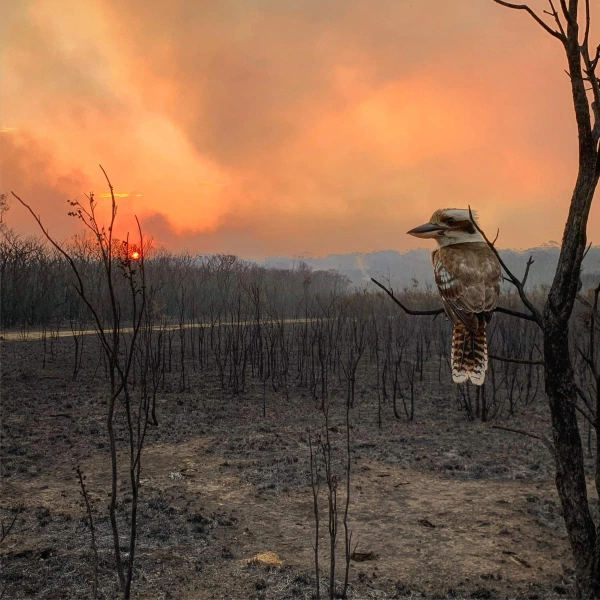
Image Source
This was written in response to the Tribe Steem Up Question of the Week, which asked 'Do we only change our thinking after a disaster'. Anyone can answer the question - use the tage #tribesteemup so we can find each other's responses.

@naturalmedicine II Discord Invite II #naturalmedicine
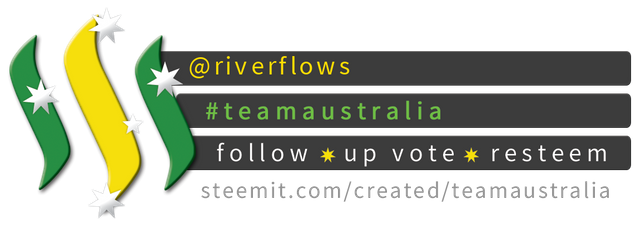
I'm seeing huge changes in the way folks are relating to the world around them. Mostly positive
Posted using Partiko Android
That's so heartening to hear.
Judul postingan nya suatu pertanyaan yang sangat menarik untuk di jawab.
Jawabannya tentu TIDAK. Jika bencana sudah menyerang itu saatnya kita untuk bertindak sesuatu,bukan lagi waktu untuk merubah cara berfikir. Yang artinya kita mengubah cara untuk berfikir sebelum bencana menyerang.
You have been curated on behalf of Inner Blocks: a community encouraging first hand content, with each individual living their best life, and being responsible for their own well being. #innerblocks Check it out at @innerblocks for the latest information and community updates, or to show your support via delegation.
This is a hell of a monologue. Thank you for taking the time to commit your thoughts to words. I upvoted and resteemed this.
Out of curiosity, what are your thoughts on the political rhetoric as of late? Do you think we're approaching another war era?
Posted using Partiko Android
Thankyou. I don't quite have a view on Iran/US yet... been focused on the home front. That's too frightening for me to contemplate.
I am so sorry for the disasters in your country, I think about Australia every day. I have stopped waiting for people to change long ago, choosing to work on myself as best I can instead but like you, I revel in the inner beauty many show in the face of disaster. Compassion is beautiful.
Thank you for sharing your beautiful musings in the wake of destruction, Sending you positive vibes and much love.
Foccussing on ourselves can make huge differences in the world xx
True story
That's an excellent and thoughtful essay (because it is much more than a "post") @riverflows. Like many, I am also horrified and saddened by the calamity in your country.
Perhaps disasters change our perceptions in the shorter run, but there's always going to be a certain tension between lasting change and basic human nature... after a while, we tend to forget about the impact of the disasters we've been through and slowly slide back towards the behaviors that (might?) have been the cause of the disaster in the first place.
Those wild fires are a tough one - once you get over 'you've brought it on yourselves you climate denying gas guzzlers' you're left with the fact that even Australia's huge consumption of fossil fuels is far from the only driver of that level of climate change - and that any meaningful change is going to require a much more co-ordinated global effort - which is so obviously very difficult.
Hence why this disaster probably won't lead to any drastic changes at the global level any time soon. Lots of sympathetic sounding offs I'm sure, and plenty of donations from tennis celebrities, but I doubt if people are going to switch their air-con off in droves!
I'm also fairly sure that if Koalas weren't dying en-masse those donations would be much smaller. Honestly, the coverage here on the uK news seemed to be about 50% Koala related - presenters asking refuge workers for 'one more shot of the Koala' during live feeds.
It's a tragedy, first of many to come I think.
Kim Stanley Robinson's books are an interesting imagining of how we might actually end up reluctantly responding to climate disaster. I think he's Australian come to think of it.
Our biggest bugbear? Stickers saying 'No oil selling in Bight' on big SUVs. The fires die down, and everyone goes back to their habits. But meanwhile... what is the individual in the face of government? Huge mandates need to come from above..and I live in naive hope public pressure MIGHT bring about change.
Unfortunately the koalas ARE a victim of the fires. Whilst it might be media driven and cute cuddly animals engender emotional gushing which result in triggered hip pocket nerves, they ARE getting close to extinction.
Totally agree with you there.... lots of sounding off means nothing. It's sooo transparent it hurts. Where's the tipping point of the masses refusing to accept political posturing and hypocrisy?
Draconian government measure do actually work to lower consumption, sad to say!
Maaate, I would be SUCH a dictator if I ruled the world!!!
Oh and I thought I hadn't heard of Kim Stanley Robinson but I read Red Mars trilogy years ago. Just googled, he's American. Interesting WIRED article on him. More 'science' fiction than science 'fiction' if that makes sense.. Might be a good easy read travelling on the kindle!
I cam across him because Naomi Klein quoted him in one of her books - I loved those Red Mars books, 40 signs of rain is more Earth focused, very techno solutions to climate change though: pumping oceans into deserts for example.
You have been touched so deeply with the disaster of wildfires in your home country but your wisdom is shining through!
Thanks for this heads up of our world seemingly being 'out of kilter' and our need for change to make something new and better out of the old world order.
Thanks also for highlighting the impermanence in our lives. Here's hoping more people call upon the great potential of humans and we can start transitioning towards making the world a better place, filled with love and compassion for each other!
To listen to the audio version of this article click on the play image.

Brought to you by @tts. If you find it useful please consider upvoting this reply.